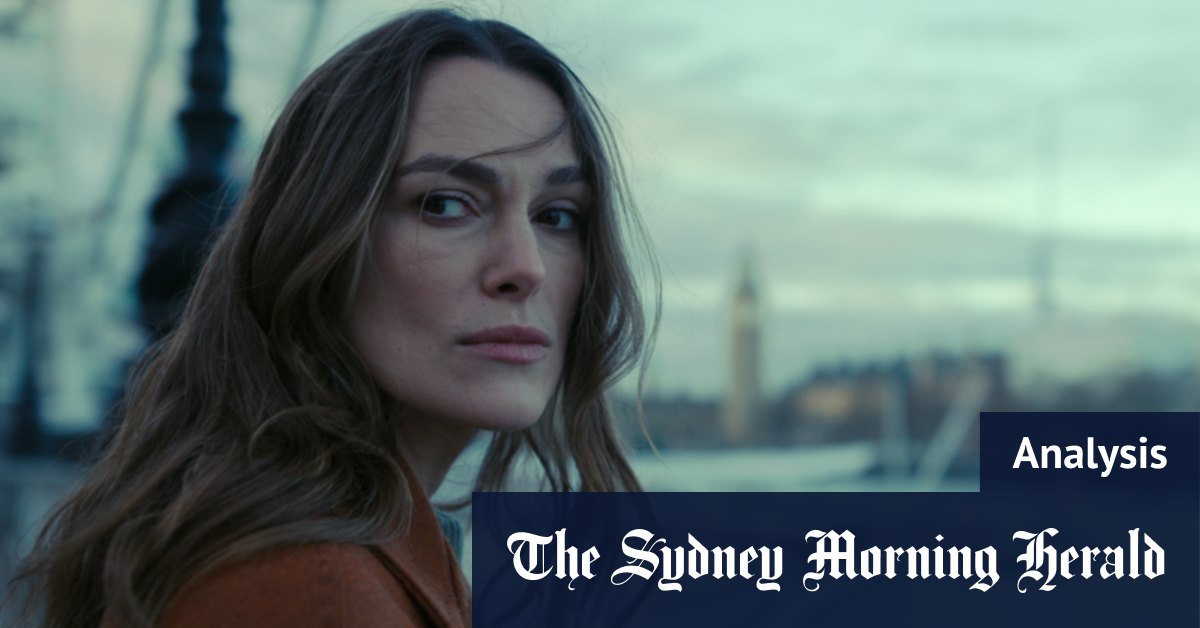
Yet, finally, it all amounts to much ado about nothing and has little lasting impact. Like too many recent Netflix offerings, Black Doves is formulaic and easy to gulp down: fast-paced, fun while it lasts but eminently forgettable. It’s like TV’s equivalent of fast food and just as nourishing: carefully calibrated, briefly filling yet ultimately unfulfilling.
Slick as they might be, many recent series made for Netflix are like this. They’re strong on plot and momentum, and are often good to look at, making the most of their settings, but lacking in substance. Occasionally, an actor will grab a role and make something of it, as Whishaw does in Black Doves and Jennifer Coolidge managed to do as the needy, infuriating heiress in The White Lotus. But for the most part, the characters function like chess pieces in service of the plot, reduced to pawns, a means to an end.

Jennifer Coolidge in The White Lotus.Credit: HBO
A number of initially buzzy shows indicate what could now be seen as The Netflix Formula, and it’s cookie-cutter stuff. You can almost hear how the pitches might’ve gone. The Perfect Couple: it’s like The White Lotus, nasty rich people behaving badly in beautiful places, with a murder mystery. Bridgerton: it’s like Downton Abbey, but sexier and more diverse, with a touch of Gossip Girl. Territory: it’s like Succession or Yellowstone, but in the outback.
And another identifiable trait: Netflix shows don’t like to linger. They want to hook you fast and keep the action moving at a clip so you’ll stay tuned. In Territory, the vast distances of the Top End are covered by characters in mere minutes, without even a passing remark about the time involved in travelling across them. It speaks volumes about the priorities of international executives, valuing pace over an authentic sense of place.
As Netflix has honed its house style, canny producers have learned what it wants and they provide it. Sister, the company behind Black Doves, has previously produced series of the calibre of Better, The Split and Chernobyl. Easy Tiger, which produced Territory, also has Colin From Accounts, Jack Irish and Rake to its credit.
Darren Star, who’s given Netflix one of its biggest hits with Emily in Paris, can clearly do colour and movement, tourist-brochure settings, fab clothes and interminable romantic triangles involving gossamer-thin characters. But when he makes Uncoupled, a more substantial comedy, it dies after a single season and is subsequently deleted from the library.

Lily Collins as Emily in Emily in Paris.Credit: Netflix
So what we get now is highly hyped shows that land with the desired impact, becoming the hot new arrival that you just have to see, and are quickly gobbled up. Grist for the mill, fodder for the hungry beast.
It wasn’t always this way. The early days of Netflix brought us series like House of Cards, Orange is the New Black, The Crown, Ozark and Bodyguard, ambitious and distinctive dramas that testified to the existence of a major force. And, while there now appears to be an unfortunate template, there are also exceptions, which, given the sheer volume of output, isn’t entirely surprising. Last year, for example, brought us Ripley, Raising Voices, Eric and Geek Girl.
But compare the behemoth that’s Netflix to HBO in its heyday, back in a time when it had cash to splash and confidence in its decision-making and allowed creative people latitude. It produced memorable shows and characters with substance and enduring impact, potent, distinctive series that offered something meaningful in a wholly original way. Think of Tony and Carmela, or just about anyone in The Sopranos; or Stringer Bell, Jimmy McNulty and Omar in The Wire; or Carrie Bradshaw and co in Sex and the City.
With that in mind, it would be great if the next hot new show from Netflix left in its wake feelings of admiration and wonder, not just the empty lure of “stay tuned for the next exciting season …”



